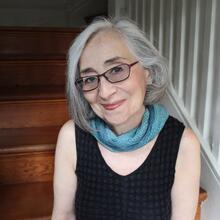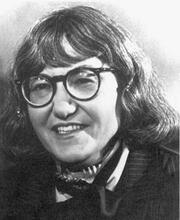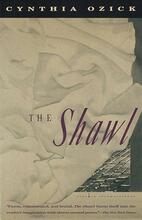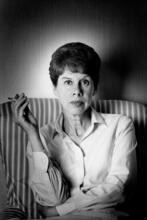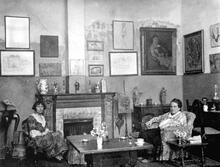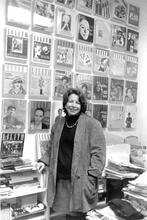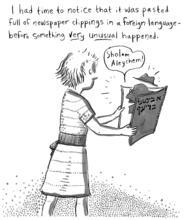Ruth R. Wisse
Ruth Wisse has made major contributions to Yiddish literature as both a scholar and an editor. Wisse earned an MA at Columbia and a PhD at McGill. In 1968, she began teaching at McGill, where she helped found the university’s pioneering department of Jewish studies; she began teaching at Harvard in 1993. She served as president of the Association for Jewish Studies from 1985 to 1988. She was the first editor-in-chief of the Library of Yiddish Classics and published a number of anthologies of Yiddish literature. She also wrote political commentaries, most famously If I Am Not for Myself...: The Liberal Betrayal of the Jews and Jews and Power. In 2000, she won the National Jewish Book Award for The Modern Jewish Canon.
As a scholar and a literary and social critic, Ruth R. Wisse is a unique figure in American Jewish letters. She bridges the worlds of Yiddish and American culture, of literature and politics, and of Israel and the Lit. (Greek) "dispersion." The Jewish community, and its areas of residence, outside Erez Israel.diaspora.
Family and Education
Born in Czernowitz, Romania, on May 13, 1936, Ruth, her older brother, and her parents Masha and Leo Roskies were admitted into Canada in 1940. Their home in Montreal was a salon for Yiddish writers, actors, and artists. All four children (two were born in the New World) received a rigorous Hebrew and Yiddish education. Her brother David G. Roskies was a professor of Jewish literature at the Jewish Theological Seminary and her sister Eva Raby a professional storyteller and Jewish children’s librarian in Montreal.
At McGill University, where she received a BA in 1957, Wisse studied with poet Louis Dudek, who was also a mentor to Leonard Cohen. But it was the Yiddish poet Abraham Sutzkever who played a pivotal role in her career by suggesting that she pursue a graduate degree in Yiddish studies at Columbia University, the only place in North America at the time that included Yiddish in a graduate degree program.
Upon her marriage to Leonard Wisse, she did just that, studying with both Max Weinreich, who had directed the Yiddish Scientific Institute (YIVO) in Vilna, and his son Uriel Weinreich; she received her MA from Columbia with an award-winning thesis on Sutzkever’s prose poem Green Aquarium. After returning to Montreal, Wisse began raising a family while she completed her PhD at McGill under Dudek’s supervision. Her dissertation, published as The Schlemiel as Modern Hero (1971), traces the evolution of the schlemiel from Yiddish to American Jewish fiction.
Academic Career
Academically, Wisse is a pioneer. She was the first to offer a course on Yiddish literature in McGill University’s English department, a request that was granted but opposed by the only other Jew in the department. In 1968, she helped found McGill’s Jewish Studies program (later the Department of Jewish Studies). In 1971, she and her family moved to Israel, where she was hired to teach Yiddish literature at Tel Aviv University, but they soon returned to Canada, where she resumed her career at McGill. In 1993, she was appointed the inaugural Martin Peretz Professor of Yiddish Literature and Professor of Comparative Literature at Harvard University, a position she held until her retirement in 2014.
Wisse is known in literary circles for her collaborative anthologies with Irving Howe: The Best of Sholom Aleichem (1979) and, together with Khone Shmeruk, The Penguin Book of Modern Yiddish Verse (1987). Her most sustained works of literary history are A Little Love in Big Manhattan: Two Yiddish Poets (1988), a study of Yiddish poets Mani Leyb and Moyshe-Leyb Halpern and their literary environment in New York, and her monographic study I.L. Peretz and the Making of Modern Jewish Culture (1991), which explores the relationship between Yiddish writing and the development of a national self-consciousness.
Wisse’s most influential scholarly work is The Modern Jewish Canon (2000), which tackles two fundamental questions of Jewish literature: “What makes a great Jewish book?” and “what makes a book ‘Jewish’ in the first place?” Covering books in Yiddish, German, Russian, Hebrew, and English—authors as stylistically, linguistically, and culturally varied as Sholem Aleichem, Franz Kafka, Isaac Babel, and S.Y. Agnon—Wisse wrote that she “tries to explain the phenomenon of a multilingual Jewish literature through a discussion of some of its greatest works of the twentieth century.” Commentary editor Norman Podhoretz declared The Modern Jewish Canon “as brilliant as it is magisterial… A book about the modern Jewish canon, it has itself secured an honored place of its own in that canon.”
Wisse’s No Joke: Making Jewish Humor (2013) questions “whether an excess of laughter might exacerbate the tensions it is meant to alleviate.” By showing how Jewish jokes, humor, and satire shift across language and context, she demonstrates how “Jews joke differently in Yiddish than in English, differently among themselves than in the presence of non-Jews, and differently in constitutional democracies than in totalitarian states” (229). She is less interested in the precise form of that humor than in the fact that Jews seem to have a greater reliance on it, sometimes to their own detriment: “…I am obliged to ask whether an excess of laughter might exacerbate the tensions it is meant to alleviate. Can a surfeit of comedy be unhealthy?” (25).
As a charismatic teacher and mentor, Wisse trained a new generation of Yiddish studies scholars who contributed to the significant expansion of research and teaching of Yiddish literature and culture at leading North American universities and cultural institutions, among them important contemporary women scholars of Yiddish (Debra Caplan, Alyssa Quint, Rachel Rubinstein, Asya Vaisman Schulman, Miriam Udel, and Sunny Yudkoff). Aaron Lansky, who went on to found the Yiddish Book Center, and novelist Dara Horn, winner of the National Jewish Book Award, also acknowledge her significant influence on their careers.
After her retirement from Harvard, Wisse was appointed Distinguished Senior Fellow at the Tikvah Fund, where she continues to lecture and produce digital courses about those writers and texts that most sustained her in the course of her reading, including the Wisdom of Jewish Literature, George Eliot’s Daniel Deronda, Sholem Aleichem’s Tevye the Dairyman, and the New York Intellectuals.
Public Intellectual
Intellectually, Wisse found her home in the political culture of the 1970s magazine Commentary. Here she measured the actual accomplishments of American Jewish fiction against its promise and introduced giants of twentieth-century Yiddish culture such as Moyshe-Leyb Halpern, Chaim Grade, I.B. Singer, and Abraham Sutzkever. Her contributions to Commentary also included rich biographical essays (“The Most Beautiful Woman in Vilna,” “What My Father Knew,” and “My Life Without Leonard Cohen”), sharp readings of contemporary Jewish culture (“The Politics of Yiddish,” “Poland’s Jewish Ghosts,” “The Hebrew Imperative,” “Yiddish: Past, Present, Imperfect”), reviews of new works by contemporary Jewish writers, and analyses of antisemitism, anti-Zionism, anti-Israelism, and free speech and political correctness on college campuses.
Like her close friend Lucy S. Dawidowicz, Wisse refused to allow the destruction of Eastern European Jewish culture to cloud her historical judgment. Out of her engagement with Yiddish culture grew an interest in modern Jewish politics and its difficulty adjusting to the reality of Jewish statehood. Her work as a public intellectual led to friendships (and disagreements) with leading post-war Jewish thinkers, among them Irving Howe, Hillel Halkin, Norman Podhoretz, and Neal Kozodoy, and with writers Cynthia Ozick and Saul Bellow, among many others.
Wisse’s Zionist critique of the American Jewish political climate was articulated in If I Am Not for Myself...: The Liberal Betrayal of the Jews (1992). She followed that work with Jews and Power (2007), which explored “the organization of politics against the Jews.” Both volumes offer a decisive reading of her political vision. Her fearless argumentation is a feature of her political essays, which appeared regularly not only in Commentary but also in The New Republic, the Jerusalem Report, and more recently in the Wall Street Journal, Jewish Review of Books, and Mosaic. She has bitterly attacked such publications as the New York Review of Books for its writing on Israel, describing it as “the Women’s Wear Daily of the American intelligentsia” because of its “responsiveness to fashion.”
Free as a Jew: A Personal Memoir of National Self-Liberation (2021) traces Wisse’s intellectual development and political engagement from Montreal to Harvard Yard. As she argues in its prologue: “What might have been a life of uninterrupted good fortune with only private setbacks came up against unwelcome social and political forces. Many of my compatriots misjudge our situation, mistaking the imperfections of democracy for its vices, condoning barbarity out of misguided sympathy, holding Jews responsible for the aggression against them, confusing regressive with progressive governance, and neglecting to fortify all that is good” (7).
Awards
Ruth R. Wisse’s The Modern Jewish Canon was awarded the National Jewish Book Award for Scholarship/Criticism (2000). Her other honors, in chronological order, include the Itsik Manger Prize for outstanding contributions to Yiddish Literature (1988), the National Foundation for Jewish Culture Award for Scholarship (2001), an honorary doctorate from Yeshiva University (2004), and the Herzl Prize from the Jewish Leadership Conference (2021).
In 2007, she was awarded the National Humanities Medal by President George W. Bush in a ceremony at the White House.
Selected Works by Ruth Wisse
The Schlemiel as Modern Hero. Chicago: University of Chicago Press, 1971.
The Best of Sholom Aleichem, edited with Irving Howe. Washington: New Republic Books, 1979.
A Shtetl and Other Yiddish Novellas, editor. Detroit: Wayne State University Press, 1986.
The Penguin Book of Modern Yiddish Verse, edited with Irving Howe and Khone Shmeruk. New York: Penguin, 1987.
A Little Love in Big Manhattan: Two Yiddish Poets. Cambridge, MA: Harvard University Press, 1988.
The I.L. Peretz Reader, edited with an introduction. New York: Schocken Books, 1990.
I.L. Peretz and the Making of Modern Jewish Culture. Seattle: University of Washington Press, 1991.
If I Am Not For Myself: The Liberal Betrayal of the Jews. New York: Free Press, 1992.
Abraham Sutzkever: The Uncrowned Jewish Poet Laureate, recording. South Hadley, MA: National Yiddish Book Center, 1994.
The Modern Jewish Canon: A Journey through Language and Culture. New York: Free Press, 2000.
Jews and Power. New York: Schocken, 2007.
Jacob Glatstein, The Glatstein Chronicles, edited with an introduction. New Haven: Yale University Press, 2010.
No Joke: Making Jewish Humor. Princeton: Princeton University Press, 2013.
Free as a Jew: A Personal Memoir of National Self-Liberation. New York: Wicked Son, 2021.
Chaim Grade, My Quarrel with Hersh Rasseyner, translated with an introduction. New Milford, CT: The Toby Press, 2022.
Cammy, Justin, Dara Horn, Alyssa Quint, and Rachel Rubinstein, eds. Arguing the Modern Jewish Canon: Essays on Literature and Culture in Honor of Ruth R. Wisse. Cambridge: Harvard University Press, 2008.


